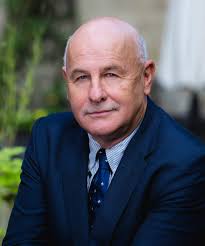Please watch this seven minute video about Fountain House, a Clubhouse Model
(9-3-19) Kenneth J. Dudek, a tireless advocate for persons with serious mental illnesses, is retiring as president of Fountain House. He has worked there nearly 28 years.
Fountain House is perhaps the best recovery program in our nation and much of its success can be credited to Dudek.
I have telephoned him several times during the past decade seeking help for someone in New York who was in the midst of a psychotic break. He always responded. He never said that he couldn’t help in some meaningful way.
As a fellow New York City mental health advocate D.J. Jaffe wrote recently in a blog tribute to Dudek, Fountain House is “the single program all the parents of seriously mentally ill wanted to get their kids into. It’s even more so today.”
Launched by persons with mental illnesses
Fountain House traces its roots to the late 1940s at Rockland State Hospital in Orangeburg, New York, when a handful patients began meeting to help one another. They shared their recovery stories, read, painted and participated in social functions. These patients carried their fellowship back to New York City where they organized what became Fountain House. They hoped their recoveries would encourage others, offer hope and gradually change society’s perception of people living with mental illness. People do get better. Persons with mental illnesses can run their own programs. 
Fountain House is a ‘clubhouse’ style program. As Jaffe noted:
“That means that people with serious mental illness run it: they answer the phones, work in the office, prepare the meals, clean the clubhouse, run events at the clubhouse and help other members of the clubhouse cope with their illness, navigate the system, develop a social network and get on with their lives.
Fountain House also provides many members with housing, facilitates their return to the education system, and provides or finds supported employment opportunities for them. To put it another way: it is the most successful peer program in the country. And that is largely because of the work of Kenn Dudek and the team he assembled.
National Need For More Recovery Programs
Today, eighty-five percent of Americans with serious mental illnesses are unemployed, 40% are homeless, and 24% are incarcerated. Fountain House helps its participants build dignity and self-esteem by working in one of seven areas: communications, culinary, education, horticulture, reception/membership, research, and wellness. Everyone plays a role. Has a task. Each area is essential to running the house.
The Fountain House model has been replicated in more than 300 locations in 30 countries and 32 states. It currently serves more than 100,000 people with mental illness worldwide. It has a high success rate in helping persons find employment and continue their educations. More importantly, the clubhouse model provides social connectivity.
New Director Named Today
Ashwin Vasan, M.D., Ph.D., will replaced Dudek as Fountain House’s new President and CEO. A primary care physician and academic, Dr. Vasan is currently an Assistant Professor at Columbia University’s Mailman School of Public Health and Vagelos College of Physicians & Surgeons, overseeing patients and teaching graduate students and trainees in general medicine, population health, and implementation science. He will maintain his academic affiliation with Columbia while leading Fountain House.
Under Dudek’s leadership, Fountain House received the 2014 Conrad N. Hilton Humanitarian Prize. That $1.5 million dollar award is only one of many awards the program has received. (See below)
There’s a popular saying at Fountain House. If you visit, you will have a difficult time telling the difference between its members and the social workers, job counselors, and others who are paid employees.
The same could be said about Kenneth Dudek as president/CEO. He blended in. Quiet, thoughtful and unassuming, he never sought the spotlight for himself but preferred to always focus on Fountain House members. He cared about everyone of them. He always made time and had a kind and encouraging word to say to every member he met during the day. Knowing them by name.
It’s not uncommon for someone who is retiring to look back and wonder: What have I accomplished?
Dudek is too modest to ask that question. But those of us who have had the pleasure of knowing him would be hard pressed to list all that he has done for others and the mental health movement. His legacy is not the many awards listed below, but the thousands of lives that have been changed for the better because of him.
He has left Fountain House in such good standing that it will carry on without him, but it will forever be grateful to him.
Fountain House awards.
2019 – New York City Mayor’s Office for People with Disabilities Sapolin Accessibility Award
2014- The 2014 Conrad N. Hilton Humanitarian Prize
2014 –Marty Smith Memorial Award by the New York Association of Psychiatric Rehabilitation Services
2013- National Council for Community Behavioral Healthcare’s Award of Excellence for education programming (First Prize)
2011- Added to SAMHSA National Registry of Evidence-based Programs and Practices
2011- Brain & Behavior Research Foundation (formerly NARSAD) Productive Lives Award
2001- Lilly Reintegration Award for Social Support and Rehabilitation (First Place)
1999- American Psychiatric Association Gold Achievement Award for Exemplary Community Programming
1996- National Alliance on Mental Illness Rehabilitation Program of the Year Award



